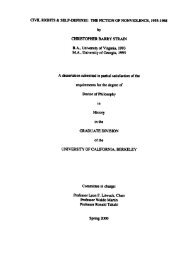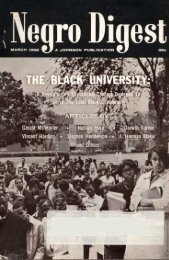Black News - Freedom Archives
Black News - Freedom Archives
Black News - Freedom Archives
Create successful ePaper yourself
Turn your PDF publications into a flip-book with our unique Google optimized e-Paper software.
that was far removed from be-bop . Mingus<br />
experimented with groups both large and small<br />
using a great deal of ensemble work and some<br />
solo space . One of the earlies examples of this<br />
new music was an album entitled<br />
"Pithecanthropus Erectus," recorded in January<br />
;011956 . This album featured a ten minute cut in<br />
which Mingus gave his impressions of the<br />
evolution of man . The sidemen on the album<br />
included Jackie McLean and Mal Waldron .<br />
In 1957 Brandeis University commissioned<br />
Mingus to compose a "jazz" piece . The resulting<br />
"Revelations" made most of the white critics sit<br />
up and take notice . Mingus' next major coup in<br />
this country took place at the Monterey Jazz<br />
Festival in 1964 . After playing a number of Duke<br />
Ellington standards, Mingus brought a 12-piece<br />
group on stage to play "Meditation on<br />
Integration ." The composition which lasted for<br />
almost 30 minutes mesmerized the crowd . The<br />
ensemble work, the bowed bass of Charles<br />
Mingus, the flute of long-time friend Buddy<br />
Collette all proved too much for the 7,000 fans .<br />
After it was over, Mingus got a standing ovation<br />
and began to get some of the attention that he<br />
deserved .<br />
Now Mingus is gone, the victim of a rare form<br />
of muscular dystrophy that attacks the central<br />
nervous system until it kills . How do you sum up<br />
a life like his or the musical contribution that we<br />
must all be made to remember?<br />
Mingus changed before the times . He was a<br />
musician of prophetic vision similar to folks like<br />
Miles and Coltrane . He began as a bebopper but<br />
left bebop to create his own singular brand of<br />
<strong>Black</strong> music . Many great names had their<br />
musical lives shaped by the Mingus touch and<br />
some not so great musicians more than rose to<br />
the challenge of Mingus' music . His groups from<br />
the days of the early WORKSHOPS included<br />
such luminaries as Eric Dolphy, Booker Ervin,<br />
Ted Curson, Jaki Byard, John Handy, to name a<br />
few . While his popularity moved like a<br />
.rollercoaster, his creativity never diminished .<br />
Always outspoken, his political nature got him<br />
into many conflicts with white "jazz" critics,<br />
and as they criticized his politics or his personal<br />
iifop, the Mingus following would decrease<br />
proportionately .<br />
Mingus, like so many other conscious<br />
musicians, was acutely aware of the exploitative<br />
role of the record companies . To combat this,<br />
Mingus started independent record companies on<br />
two occasions . The first, Debut Records, was<br />
formed with the help of Nlax Roach and released<br />
the "Jazz at Massey Hall Concert" mentioned<br />
earier . In 1964, Mingus took his tape recorder to<br />
Monterey to record the historic session which<br />
featured the extended work "Meditations on<br />
Integration ." A two record set "Mingus at<br />
Monterey" was released on the Charles Mingus<br />
label capturing the spirit of the entire concert .<br />
The outstanding thing about Mingus was his<br />
heart . It is this heart, this all consuming life force<br />
which sings out so clearly in his music . This same<br />
force made Mingus extremely sensitive to racism .<br />
Many of his compositions were based on his<br />
strong opposition to racists and racism . Tunes<br />
like "<strong>Freedom</strong>," Faubus Fales, and Meditatiops<br />
on Integration," made his feelings known .<br />
Mingus was not limited to music to` express his<br />
political views ; he could rap and write . His<br />
conversations and interviews were full of<br />
opposition to oppression and his legendary,<br />
partial autobiography, "Beneath the'<br />
Underdog," made quite a few of his political<br />
views clear .<br />
Musically, the Mingus contribution has to be<br />
analyzed by giving a close listen . Mingus was a<br />
romantic, a kind of Ellingtonian, using a number<br />
of in instruments to express a singular vision . His<br />
most dynamic compositions utilize large groups<br />
and many techniques that point to blues and<br />
gospel roots . Mingus loved the oral quality of<br />
<strong>Black</strong> music and therefore used voices or<br />
instrumental interpretations of what voices<br />
sound like in many works . His music was deeply<br />
rooted in the Afrikan continuum but modified<br />
certain elements to maximize his ability to<br />
express contemporary themes .<br />
As with so many others we will be playing<br />
catch up ball with the Mingus legacy . He is gone<br />
and many of us cannot realize what we have<br />
missed . To have never seen the man in person, to<br />
attempt to recreate the experience that brought<br />
his music into being is a crime, but nevertheless a<br />
crime we must commit . To be more worried<br />
about Marvin Gaye's latest, Evelyn<br />
"Champagne" King's 45, or the new disco step<br />
as opposed to remembering Mingus, illustrates<br />
the depth of our oppression . His records are still<br />
available, his autobiography will probably be<br />
released at some point, and reviews of live<br />
performances are in back issues of racist "jazz"<br />
publications like Downbeat . The choice is<br />
ours we may submit to television and FM 'radio<br />
or we can reclaim aspects of our culture that are<br />
essential to our survival .<br />
Words I used to describe our loss when<br />
Malcolm X was assassinated are again relevant :<br />
honor yr proplicts <strong>Black</strong> man ,<br />
walk n lire n talk with them<br />
do'not scope them when they pas'. iron view<br />
Donor yr proplicts<br />
11 s110 111.1 IT he them<br />
n be them <strong>Black</strong> Man<br />
n he t hem
















